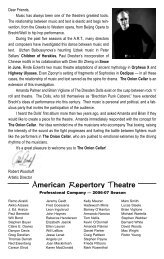Porgy and Bess Program [pdf] - American Repertory Theater
Porgy and Bess Program [pdf] - American Repertory Theater
Porgy and Bess Program [pdf] - American Repertory Theater
You also want an ePaper? Increase the reach of your titles
YUMPU automatically turns print PDFs into web optimized ePapers that Google loves.
GEORGE GERSHWIN<br />
Music<br />
George Gershwin was born in Brooklyn on<br />
September 26, 1898, <strong>and</strong> began his musical training<br />
when he was 13. At 16 he quit high school to<br />
work as a “song plugger” for a music publisher,<br />
<strong>and</strong> soon he was writing songs himself.<br />
“Swanee,” as introduced by Al Jolson, brought<br />
George his first real fame <strong>and</strong> led to his writing a<br />
succession of 22 musical comedies, most with his<br />
older brother, Ira. The Gershwins’ shows include<br />
Lady Be Good; Oh, Kay!; Strike Up The B<strong>and</strong>; Girl<br />
Crazy; <strong>and</strong> the Pulitzer Prize-winning Of Thee I<br />
Sing. From his early career George had ambitions<br />
to compose serious music. These ambitions were<br />
realized in some of his masterpieces, among them<br />
“Rhapsody In Blue,” “Concerto In F,” “An<br />
<strong>American</strong> In Paris” <strong>and</strong> “Second Rhapsody.” In<br />
the late ’20s George became fascinated by the<br />
DuBose Heyward novel <strong>Porgy</strong>, recognizing it as a<br />
perfect vehicle for opera using jazz <strong>and</strong> blues idioms.<br />
George’s “folk opera” <strong>Porgy</strong> <strong>and</strong> <strong>Bess</strong> opened<br />
in Boston on September 30, 1935, <strong>and</strong> had its<br />
Broadway premiere two weeks later. In 1937<br />
George was at the height of his career. While<br />
working on the score of The Goldwyn Follies in<br />
Hollywood, he collapsed, <strong>and</strong> on July 11, died of<br />
a brain tumor. He was not quite 39 years old.<br />
DUBOSE HEYWARD<br />
Librettist/Lyricist<br />
DuBose Heyward (1885–1940) was a native <strong>and</strong><br />
life-long resident of Charleston, South Carolina.<br />
Although born into modest economic circumstances,<br />
he was of an old Charleston family <strong>and</strong><br />
his ancestors were prominent members of<br />
Charleston society, one of whom, Thomas<br />
Heyward, Jr., was a signer of the United States<br />
Declaration of Independence. In the early 1920s,<br />
Heyward co-founded the Poetry Society of South<br />
Carolina <strong>and</strong> co-published Carolina Chansons:<br />
Legends of the Low Country, which established his<br />
reputation as an <strong>American</strong> poet. In 1923 Heyward<br />
married Dorothy Hartzell Kuhns (1890–1961),<br />
whom he had met the previous year at the<br />
MacDowell Colony, an artists’ retreat in New<br />
Hampshire, <strong>and</strong> who was an aspiring author from<br />
Ohio. He then devoted himself full-time to writing.<br />
The first major result of this effort was the<br />
novel, <strong>Porgy</strong>, published with great success in 1925.<br />
In his 2000 biography of Heyward, James<br />
Hutchisson describes <strong>Porgy</strong> as the first major southern<br />
novel to present African <strong>American</strong>s realistically<br />
<strong>and</strong> without condescension. Dorothy inspired,<br />
<strong>and</strong> collaborated in, the transformation of <strong>Porgy</strong><br />
32 AMERICAN REPERTORY THEATER<br />
Creative Team<br />
into a play, which ran a total of 367 performances<br />
on Broadway. The Heywards later collaborated<br />
with George <strong>and</strong> Ira Gershwin in the creation of<br />
the opera, <strong>Porgy</strong> <strong>and</strong> <strong>Bess</strong>, contributing the libretto,<br />
based largely on the play, <strong>and</strong> co-writing many of<br />
the songs. Heyward’s many other works include<br />
the novel, Mamba’s Daughters, which he, together<br />
with Dorothy, transformed into a play. Mamba’s<br />
Daughters successfully opened in New York in<br />
1939, with Ethel Waters in the cast; a 1997/1998<br />
production was awarded an Obie, <strong>and</strong> was also<br />
presented at the 1999 Spoleto Festival in<br />
Charleston. Among his other works were the play,<br />
Brass Ankle, the novella, Half Pint Flask, <strong>and</strong> the<br />
novel, Peter Ashley, all of which portray the lives of<br />
African <strong>American</strong>s in Charleston <strong>and</strong> the surrounding<br />
low country. He also wrote (for his<br />
daughter, Jenifer) Country Bunny <strong>and</strong> the Little Gold<br />
Shoes, which became an <strong>American</strong> classic children’s<br />
book, <strong>and</strong> the screenplays for the movie versions<br />
of Eugene O’Neill’s Emperor Jones, starring<br />
Paul Robeson, <strong>and</strong> Pearl Buck’s The Good Earth.<br />
IRA GERSHWIN<br />
Lyricist<br />
Ira Gershwin, the first songwriter to be awarded<br />
the Pulitzer Prize, was born in New York City on<br />
December 6, 1896. In 1917 The Evening Sun published<br />
his first song (“You May Throw All The<br />
Rice You Desire But Please Friends, Throw No<br />
Shoes”). Four years later Ira enjoyed his first<br />
major stage success, Two Little Girls in Blue, written<br />
with another Broadway newcomer, Vincent<br />
Youmans. In 1924 Ira <strong>and</strong> his brother, George,<br />
created the smash hit Lady Be Good <strong>and</strong> went on<br />
to continue their remarkable collaboration<br />
through a dozen major stage scores, producing<br />
such st<strong>and</strong>ards as “Fascinating Rhythm,” “The<br />
Man I Love,” “S’ Wonderful,” “Embraceable<br />
You,” “I Got Rhythm,” “But Not For Me” <strong>and</strong><br />
others far too numerous to mention. During his<br />
long career, Ira also enjoyed productive collaborations<br />
with such songwriters as Harold Arlen,<br />
Vernon Duke, Kurt Weill, Burton Lane <strong>and</strong><br />
Jerome Kern, with whom he created his greatest<br />
song hit of any one year, “Long Ago And Far<br />
Away.” Ira Gershwin died on August 17, 1983,<br />
in Beverly Hills, California.<br />
SUZAN-LORI PARKS<br />
Adapter/Additional Scenes<br />
A.R.T.: The America Play. Named one of Time<br />
magazine’s “100 Innovators for the Next New<br />
Wave,” Ms. Parks’ plays include The Book of<br />
Grace, In the Blood (2000 Pulitzer Prize finalist),


![Porgy and Bess Program [pdf] - American Repertory Theater](https://img.yumpu.com/24481101/32/500x640/porgy-and-bess-program-pdf-american-repertory-theater.jpg)
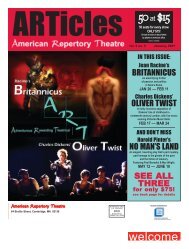
![Wild Swans Program [pdf] - American Repertory Theater](https://img.yumpu.com/49339866/1/167x260/wild-swans-program-pdf-american-repertory-theater.jpg?quality=85)
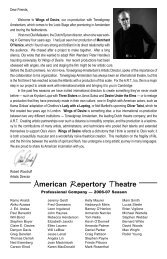
![Press Release: Trojan Barbie [pdf] - American Repertory Theater](https://img.yumpu.com/47571290/1/190x245/press-release-trojan-barbie-pdf-american-repertory-theater.jpg?quality=85)
![Articles issue as 4_2 [pdf] - American Repertory Theater](https://img.yumpu.com/45053160/1/190x249/articles-issue-as-4-2-pdf-american-repertory-theater.jpg?quality=85)
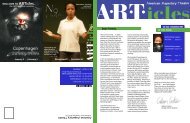
![Three Pianos Program [pdf] - American Repertory Theater](https://img.yumpu.com/41616353/1/167x260/three-pianos-program-pdf-american-repertory-theater.jpg?quality=85)
![Three Sisters [pdf] - American Repertory Theater](https://img.yumpu.com/40969361/1/190x245/three-sisters-pdf-american-repertory-theater.jpg?quality=85)

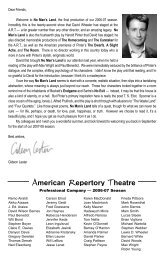
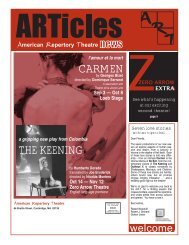
![Program: Sleep No More [pdf] - American Repertory Theater](https://img.yumpu.com/24629394/1/167x260/program-sleep-no-more-pdf-american-repertory-theater.jpg?quality=85)
![Program: Carmen [pdf] - American Repertory Theater](https://img.yumpu.com/24481072/1/190x245/program-carmen-pdf-american-repertory-theater.jpg?quality=85)
